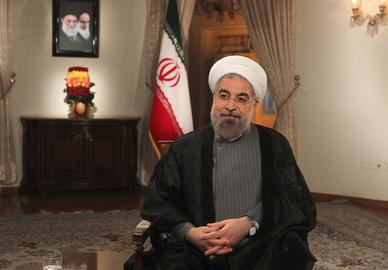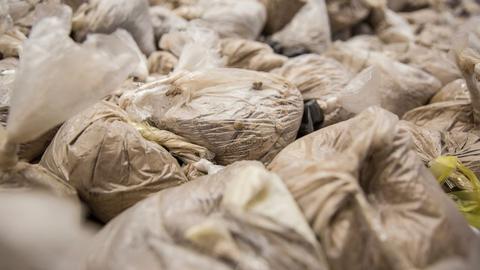President Hassan Rouhani has announced that if the United States returns to the nuclear deal, Iran will reinstate its adherence to the terms of the agreement, taking its lead from the US. If the US returns, he said, either with immediate effect or gradually, the Islamic Republic will use the same timetable to re-instate its own commitments. If the US chooses not to return, he said, “fair enough”.
The president of the Islamic Republic made his announcement on Wednesday, February 17.
On the same day, the Supreme Leader Ali Khamenei reiterated this pledge, saying Iran would take an ”action-for-action” approach to the deal, formally known as the Joint Comprehensive Plan of Action (the JCPOA).
In recent weeks, there has been a flurry of remarks and responses between Iranian, US and European officials, with the deadline looming on February 23. The rocket attacks on coalition forces in Erbil in the Iraqi Kurdish autonomous region on February 15 —which an Iranian-backed militia is said to be responsible for —have added pressure to the situation and complicated the matter.
February 23 Only Days Away
Iranian parliament passed a new law two months ago stipulating that if US sanctions on Iran are not lifted, Iran will increase its nuclear activities, reduce international oversight, and, most importantly, end the voluntary implementation of the Additional Protocol by February 23, 2021.
At the time the law was passed, Rouhani expressed anger at the decision, to such an extent that he even refused to report to parliament to present the bill for the following year's budget. He later claimed that although he considered the parliamentary resolution "harmful" and did not agree with it, his absence from parliament was due to coronavirus restrictions.
Some Supreme National Security Council senior officials also sided with parliament, making it obvious that Rouhani was apparently unaware of the decision it had reached, despite being chairman of the council.
Hassan Rouhani's apparent opposition did not last long, and he and his foreign minister, Mohammad Javad Zarif, repeatedly insisted on implementing the new nuclear law and keeping to the February 23 deadline.
The Rouhani government urgently needs the JCPOA to be revived, on both economic and political grounds. It is imperative that it gains access to monetary and banking resources it is currently cut off from due to sanctions.
Although Kazem Gharibabadi, Iran's representative to the International Atomic Energy Agency (IAEA), spoke to reporters and tweeted to the IAEA regarding the official announcement of the February 23 deadline, Rouhani's main concern has been that the threat would further complicate the US’ return to the JCPOA.
Rouhani and Khamenei Statements
"People should be in no doubt; we defeated the United States," Rouhani told a cabinet meeting on Wednesday, February 17. "America has to come back; there is no other way."
Rouhani claimed that during his visit to the United Nations, Donald Trump "sent messages eight times in one afternoon to meet, and we refused.” He added that he did not accept the US suggestion that the matter of Iran's missile activities and its role in the region be discussed alongside the previous agreement. US officials have yet to respond to Rouhani's remarks.
In recent months, a number of European officials have stressed the importance of the US returning to the JCPOA, while acknowledging American concerns about Iran's missile program and its operations in the region. Some have called for fresh discussions to get the agreement back on track.
"Europe should know that if we had accepted the issue of missiles and the region to be added to the agreement -- even as a title for debate in future -- Trump would have returned to the JCPOA at the beginning," Rouhani said on February 17.
An hour after Rouhani's speech came the Supreme Leader’s own public address. He was careful to mention the JCPOA only at the end. "Words and promises are useless,” he said. “This time action alone is useful; if we see action from the other side, we will act as well. With words and promises, the Islamic Republic will not be satisfied this time like it has been in the past."
Erbil Attack
But while issues regarding the JCPOA were addressed in speeches and public comments, something very real happened in Erbil.
Fourteen rockets were fired at Erbil airport near the US military base on Monday, February 15, killing an American contractor and wounding five other people. At least one of the wounded was an American.
The attack was considered to be the most intense operation against US forces in recent months. An emerging and largely unknown group, Saraya Olia al-Dam, claimed responsibility for the attack. The group announced its activity in the region in 2020; experts and analysts advise that the group consists of people hand-picked by Tehran to take action in Iraq.
The US Secretary of State and the foreign ministers of France, the United Kingdom, Germany and Italy strongly condemned the attack in a joint statement, and government officials from the Biden administration pledged to "hold accountable" the perpetrators.
At the same time, the Iranian foreign ministry also condemned the attack and denied "suspicious rumors" about its links with the Islamic Republic.
The Key Questions
Will the JCPOA be revived? Or will it remain in hibernation? If the administration of Joe Biden returns the US to the JCPOA, will it do so in the remaining five months of Rouhani's term? Will the JCPOA be revived in its current form without any change? Will the US and Europe fall short in the face of the verbal — and even physical — threats issued by the Islamic Republic?
For the most part, analysis over the last two days has been focused on the February 23 deadline and the attack on Erbil.
Some analysts believe the recent threats issued and deadlines set by the Islamic Republic have not prompted a change of view within the Biden administration, and the new White House team continues to insist it plans to consult with US allies, partners and friends before taking any action.
The implementation of various stages of Iran's new nuclear law began in January, including increased nuclear activities and facilities in Isfahan beginning to produce metal uranium.
Although US State Department spokesman Ned Price said last week that the US was still not engaged with the JCPOA, US Secretary of State Anthony Blinken said: "The door to diplomacy is open. Iran is far from fulfilling its obligations. We have to see what it does."
Other analysts have theorized that the Islamic Republic carried out the rocket attack on Erbil to test Biden's government, and if the United States does not respond, it will amount to a failure of the new US government, and even a defeat.
Meanwhile, Elliott Abrams, the former US envoy to Iran, wrote that the new US administration had restricted its reaction to words alone, but that practical action needed to be taken.
However, as some observers have said, even if both sides have a serious will to return to the JCPOA, the current situation has presented a host of challenges that will be far from easy to address.
visit the accountability section
In this section of Iran Wire, you can contact the officials and launch your campaign for various problems



























comments